Analysis: research into fair and decent work in Irish hospitality produced many recommendations which have yet to be acted on by Government
As the hospitality sector emerged from the pandemic, I wanted to research why some workers chose to stay in hospitality jobs and others chose to leave. This would be a unique piece of research (given the circumstances), and timing was critical.
In July 2021, the Irish Government announced that in-door services for customers who had evidence of vaccination, or evidence of recovery from Covid, would be permitted. With the onset of the omicron variant in December 2021, the Government introduced new restrictions that lasted for most of January 2022.
During the phased re-opening, it became clear that many hospitality workers would not return to their jobs. In June 2022, Failte Ireland reported that 90% of businesses were experiencing staff shortages; they had earlier reported 40,000 vacancies across the tourism and hospitality sector.
We need your consent to load this rte-player contentWe use rte-player to manage extra content that can set cookies on your device and collect data about your activity. Please review their details and accept them to load the content.Manage Preferences
From RTÉ Radio 1's Today with Claire Byrne, a discussion on restaurant closures and changes with Richard Jacob (former owner of Idaho café in Cork), Mike Tracey (former owner of BakeHouse22 in Limerick) and Gina Murphy (Hugo's in Dublin)
I was concerned by the unsubstantiated rhetoric that workers were either 'too lazy' to come back to work, or they had ‘had it too good’ on the Temporary Covid-19 Wage Subsidy Scheme. But if such rhetoric had no evidence to back it up, I had no evidence to refute it. Hence my motivation for this study.
My intention was to do a pilot study that would be indicative rather than representative, and could potentially trigger a larger scale study. I began the study in January 2022 and it had three phases:
(i) A screening questionnaire to deem suitability and collect bio details (26 respondents). Accessing hospitality workers is a challenge so I used social media platforms to explain the purpose of the study, and distribute the questionnaire.
(ii) voice recording where respondents were given the scenario that they were asked by a government task force to identify the three biggest challenges faced by hospitality workers on re-opening, and three recommendations they would suggest for improving hospitality work. (13 audio files received)
(iii) Zoom interviews with 11 of the same respondents using a semi-structured interview format
I was able to share the emerging findings of this study with the Joint Oireactas Committee on Tourism, Culture, Arts, Sports & Media, and to consequently inform their report on Working Conditions and Skills Shortages in Ireland’s Tourism and Hospitality Sector, published in November 2022. The Joint Committee heard, and listened to, the voice of hospitality workers, as represented in this research. My view is that the 11 recommendations in this report would go a long way to reform hospitality working conditions in Ireland.
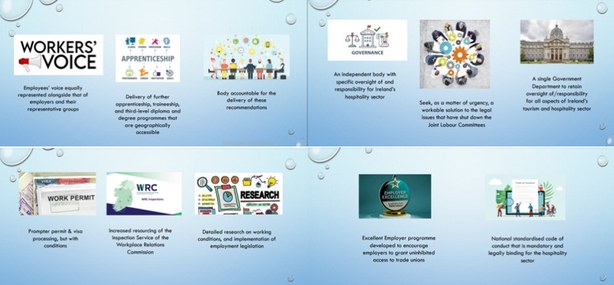
But the report has been sadly left to gather dust. To my knowledge, none of the recommendations has been acted on in full, despite my repeated written appeals to the lead authors of the report and the minister responsible. Part of the challenge is that some of these recommendations fall between two government departments, Tourism, Culture, Arts, Gaeltacht, Sport and Media on the one hand and Enterprise, Trade and Employment on the other.
So, what emerged from this project? 26 people responded to the survey. 12 had remained in the same job, four moved to another hospitality job, six chose to leave the industry, three were made redundant, and one left employment. 21 respondents were over 25 years of age. All bar one had over three years’ experience in hospitality and 16 had formal hospitality qualifications. They were 50/50 male/female and 21 identified as Irish.
The audio files proved to be a valuable method. In their own voices, the respondents shared their insights into the challenges facing hospitality post-pandemic, and their recommendations for improvement.
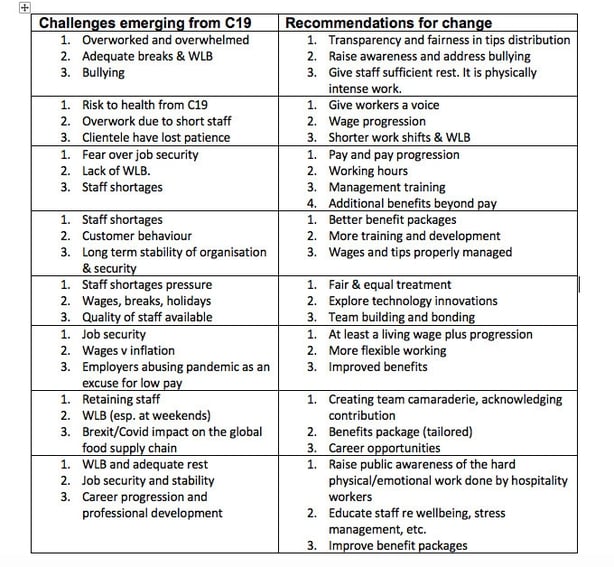
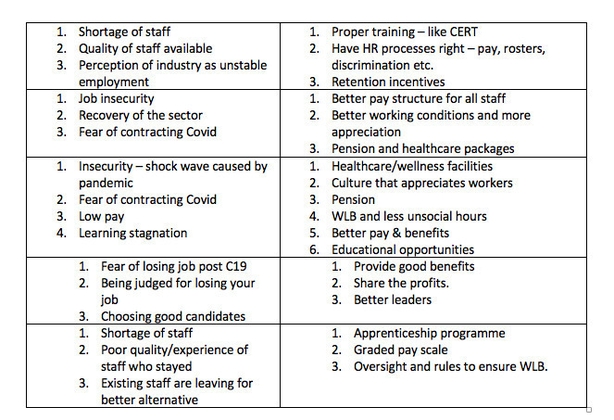
Interestingly, there were several repeated issues across respondents. The pandemic shocked what traditionally was a stable sector for employment and this left a hangover of insecurity. Pay and wider benefits featured repeatedly, as did working hours and the relationship with work-life balance. The provision of training and development opportunities for career progression was a common theme, alongside the impact of staff shortages on those who remained, and the fear of exposure to the virus.
From a research perspective, the in-depth interviews were most revealing. Seven of those interviewed had chosen to stay in hospitality (in the same establishment or another), while four left or moved elsewhere. Part of the interview focused on asking participants to evaluate their job against the features of decent work.
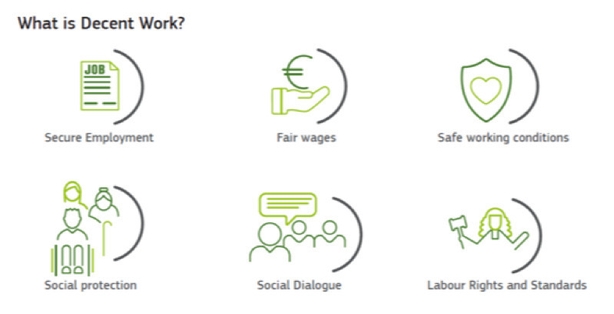
Respondents referred to living pay check-to-pay check. If they got sick, they lost income. The long and unsocial hours had negatively impacted relationships with friends and family. Only one of the participants was a member of a trade union.
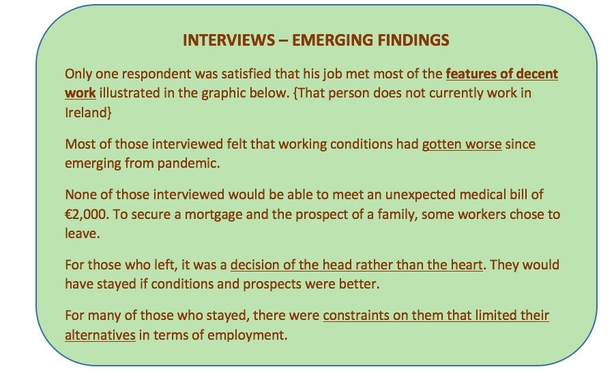
All of the participants, whether they stayed or left, loved hospitality work with a passion. I am convinced that if individual establishments addressed the recommendations from workers, staff shortages would cease to be a significant problem and businesses would thrive for the benefits of all stakeholders. My hope is that the relevant Government ministers Catherine Martin and Simon Coveney will realise the recommendations of the Joint Committee Report as evidence of their commitment to fair and decent work in hospitality and tourism.
A symposium on Fair Work in the Hospitality Sector will take place at the University of Galway in conjunction with the Irish Academy of Management on August 23rd.
The views expressed here are those of the author and do not represent or reflect the views of RTÉ






